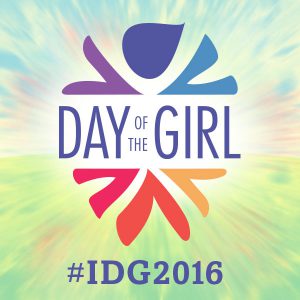Girls’ Rights and Agenda 2030
By Katherine Maloney, Dominican Volunteer
The International Day of the Girl Child and the “Girls Speak Out” takeover of the United Nations Economic and Social Council Chamber was on October 11. As a proud member of the Working Group on Girls, the Dominican Leadership Conference participated in “11 Days of Action” on social media to raise awareness of the struggles that girls are facing around the globe, with daily Twitter conversations about the need for the International Day for Girls, data on girls, the acknowledgement of the unique abilities of every girl, the need for mentors and positive role models, and the importance of girls’ voices.
Day 1 was a discussion on how the International Day for Girls is needed because stark inequality persists. On Day 2, UNICEF called on the global community to bring to light data about girls. It was found that of 2,000,000 girls recruited as “U-Reporters,” by UNICEF, 1,500,000 reported that gender violence is an issue in their community, and 100,000 pledged to act within their community to stop this violence. Anyone can join U-Report and help to support the rights of children and continue this effort to end gender violence. On Day 3, “star power” was discussed, reinforcing the belief that “every girl has a bright, shining Star inside of herself that makes her unique, strong, and happy.” By acknowledging these “stars,” and ensuring that policies allow them to brightly shine, girls are empowered to achieve their full potential. On Day 4, the contributions of women to help empower girls were highlighted. Women can act as advocates for girls, and can be mentors and role models for girls to find their own voice, inner “star” and passions. On Day 5, the organizations and activists on the front lines of making girls’ voices heard were acknowledged. Without these organizations and the support they provide, there would be no one speaking up for the world’s girls, who cannot always speak up for themselves. It is inspiring to see what other organizations are doing, and to acknowledge our own contributions at the Dominican Leadership Conference in this area! Discussion for Days 6-11 helped us to band together as the social media community, the NGO community, and the United Nations community to prepare for Girls Speak out, during which girls from around the world were invited to share poetry, dance, and other expressive pieces about girls rights, and where girl advocates spoke of their work to amplify the voices of the world’s most marginalized and vulnerable girls.
With the launch of Agenda 2030, girls’ rights are on the forefront of the future of sustainable development. Sustainable Development Goal 5 pertains directly to gender equality and strengthening government responsibility to ensure the rights of women and girls.
Other Sustainable Development Goals, including goals 3, 4, and 6, also explicitly mention the rights and protection of girls. While equality is within close reach in education, girls are still facing barriers. In some countries, girls are not able to receive proper health care or nutrition, and therefore they face a higher mortality rate. Child marriage is still prevalent around the world, with approximately 37,000 girls married each day, making for over 15 million girls under the age of 18 married each year. Child marriage often places a girl’s life on hold, and often forces girls to leave school and discontinue their education. This means that they are often unskilled, and cannot contribute to the workforce, creating a direct impact on economies around the world and perpetuating the cycle of poverty.
Goal 3, which pertains to health and well-being, states that girls are at an increased risk of contracting HIV due to gender-based violence, inequality, discrimination, and violence. In fact, of the 250,000 new cases of HIV in adolescents in 2013, roughly 166,000 – around two thirds – were girls.
Goal 6, which pertains to access to sanitation and water, is also relevant for girls. Girls in areas such as sub-Saharan Africa, which lacks sustainable water sources, are put at a disadvantage because they spend tremendous amounts of time on a daily basis fetching water. Collectively, it is estimated that women and girls spend an average of 200 million hours per day collecting water. Lack of access to sanitary pads also creates increased inequality and lack of opportunity for girls. Without sanitary pads, millions of girls are forced to stay home from school for days at a time each month. According to Huru International, some girls are forced to use unsafe and unsanitary substitutes for menstrual products, such as leaves or mattress filling, and some even participate in transactional sex just to obtain decent sanitary products. Potential byproducts of this transactional sex, such as pregnancy, HIV and other sexually transmitted diseases, further places girls at a disadvantage socially and economically.
Obviously, there is still a significant need to push the rights and protection of girls to the front of the agenda at the United Nations. Girls and women make up half of the world’s population, so equality and access to opportunity are crucial for sustainable development. As Secretary of State John Kerry said, “No team can compete without all of its players, and no country can succeed without women.”
Please keep up with our efforts to raise awareness about the rights of girls – anyone can be part of this advocacy! Follow the Dominican Leadership Conference on Twitter (@dlcngoun) and Facebook, and share this briefing to raise more awareness and encourage more study about the conditions girls face. More information on the International Day of the Girl Summit can be found here; there are just 360 days until #IDG2017!


 Dominican Leadership Conference
Dominican Leadership Conference